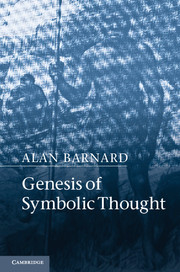5 - The flowering of language
Published online by Cambridge University Press: 05 August 2012
Summary
Language is the key. There were relevant changes in the brain that enabled greater cognitive skills, and relevant too are current debates and recent discoveries, most famously the discovery of a mutation on the FOXP2 (forkhead box P2) gene which governs aspects of both speech and language (Enard et al. 2002). Thus (full) language appears to be relatively recent in hominin evolution and equally appears to have a biological basis. There have been suggestions that Neanderthals, as well as Homo sapiens (or Homo sapiens sapiens), underwent the required mutation for the development of full language (e.g., Krause et al. 2007). These genetic findings in FOXP2 are supported also by archaeological evidence from Kebra Cave in Israel in which a 60,000-year-old Neanderthal skeleton was found to possess a hyoid bone similar to modern humans, suggesting that they ‘may have been capable of complex speech’ (Wells 2011: 100).
Such findings raise profound questions, particularly if John Shea is correct in his interpretation of recent FOXP2 results. He points out that we now have DNA from Neanderthal skeletal material which suggests that the Neanderthals had the right genetic makeup for language. Pointing to ‘strong selective pressure for spoken language’, and therefore ‘prior selective pressure for symbolic communication’, he argues that Homo sapiens was probably not the only species to use symbols (Shea 2011: 25). Rather, H. sapiens is simply the only one still to survive.
- Type
- Chapter
- Information
- Genesis of Symbolic Thought , pp. 83 - 103Publisher: Cambridge University PressPrint publication year: 2012



